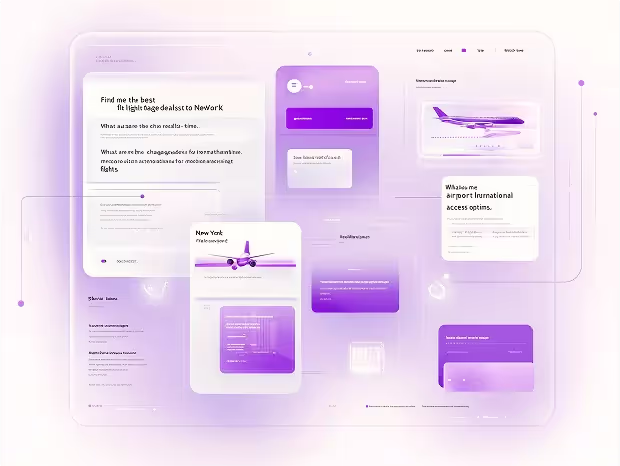Create a Chatbot For Aviation
Offer your customers a stress-free flight experience with our Kaily chatbot. Help with web check-ins, give real-time updates on flights, offer booking support, and answer customer queries 24x7.


Create a Chatbot For Aviation
Offer your customers a stress-free flight experience with our Kaily chatbot. Help with web check-ins, give real-time updates on flights, offer booking support, and answer customer queries 24x7.
How to create a chatbot for aviation?
Sign up for free
Open Kaily on your web browser. Then click on the “Sign Up” button at the top of the page. Enter your name, email address, and password to create an account. Alternatively, you can also create a profile in one click using your Google or Apple ID.
Customize the chatbot
After creating your profile, set the chatbot's tone, style, colour, and overall appearance. This is important as it lets you customize the chatbot to fit your brand personality. We always recommend keeping your chatbot style friendly and welcoming.
Train and test
You must train and test the chatbot before deploying. You can train the chatbot to answer in a specific way. Then monitor how it performs. This is an ongoing process that ensures your chatbot always delivers quality responses.
Deploy the chatbot
Once you are satisfied with the output of your chatbot, you can deploy it on your website or business tools your team is using. You can also connect the chatbot with CRM to give it access to your customer data if you are looking to offer personalized services to your customers.


What is a chatbot for aviation?
An aviation chatbot is an AI robot that you can install on your website to handle customer inquiries. You can use it to assist them with bookings, baggage, post-flight, web check-in, seat selection, current flight status, and so on. For instance, you can ask the chatbot, "Are there flights from New York to Dubai next week?" The chatbot will give him live updates about available tickets, prices, and journey times. Another traveler can request the chatbot to know the current status of a connecting flight. He can instantly know whether it's delayed, on time, or canceled and make his journey plans accordingly.
Additionally, customers can also get information about in-flight and post-flight services from the chatbot. Most of the time, customers have no idea about the in-flight services they can opt for. Even if they do, it takes some time to log in to your profile or enter PNR to book food and other services. With a chatbot, they can quickly book in-flight services. But if you are looking to offer this kind of personalized service, you will have to connect your CRM with the chatbot. This is because the chatbot will need access to customer data to check their flight status or help with in-flight services.
In addition, the rewards can also be managed by the customers with the chatbot. They can view their points, coupons, and discounts. Furthermore, they can redeem the rewards, such as a book reward, a flight, an upgrade, a booking, lounge access, and so on. To sum up, the chatbot enhances user experiences, facilitates administrative processes, minimizes the airline's expense on support personnel, and generates customer loyalty.
Why is there a need for an aviation chatbot?
Create an aviation chatbot with Kaily in 4 easy steps and transform customers’ travel experiences with your airline.
24x7 Instant support
Customers travel across the world in different time zones. They can have queries or require assistance at any time. Usually, the staff is not available to help at odd hours. A chatbot can help customers resolve their queries and find accurate information quickly at any time. So now they don’t have to depend on the support team to pick up their calls or reply to their emails.
Improve customer experiences
Whenever a customer faces any issue, they either call the airline support number or write an email. In both cases, they have to wait to get answers. But customers can get the information they are looking for instantly with our Kaily chatbot. Whether it's real-time flight status or an issue with bookings, the chatbot gives relevant answers. This improves the overall customer experience with the airline and builds trust.
Reduce support cost
Airlines have to have a big support team and staff to handle customer queries at the desk and via email. And still, they fail to offer quality support and travel experiences to their customers. A chatbot can answer frequently asked questions instantly and help customers with common tasks like booking, web check-ins, flight status checking, and more. This improves the customer interactions with your airline and saves you from spending more on support staff.
Reduce staff workload
Airline support staff are often burdened with trivial customer queries. So, the customers with complex issues have to wait. A chatbot can automate common customer queries, so the staff gets the time to address high-priority tasks efficiently and cater to customers on the ground. This not only reduces the workload for staff but also increases customer satisfaction with the airline's services.


Who needs an aviation chatbot?
Aviation AI agents benefit almost anyone who is part of the travel process. Airlines, whether large or small, can utilize AI agents to deal with customer inquiries, process bookings, send flight status updates, and even assist with online check-ins. Rather than having passengers on hold waiting for a human operator, they can receive instant answers at any time, day or night.
AI agents also help airports. They can assist passengers in navigating terminals, locating lounges, viewing security wait times, or finding their boarding gates without getting confused. A chatbot can be such a personal guide in a crowded airport.
Travel agencies and website booking platforms leverage AI agents to provide real-time flight search, ticket reservation, and customer assistance — all within a basic chat window. Private jet services, charter operators, and air freight companies are no longer exceptions from leveraging AI agents to assist in scheduling, tracking, and communication with customers.
It's not just for big airlines either. Small regional airlines and local airports can also use AI agents to provide 24/7 service without a large support team. If you're in aviation and you want quicker service, happier customers, and lower support costs, a chatbot is one of the simplest ways to achieve this.
Key benefits & features of a Kaily aviation chatbot
Transform the way your customers use your airline services with an aviation chatbot. Kaily chatbot answers common queries and helps with bookings, in-flight service assistance, baggage information, real-time updates, and more.
Handles disruptions smoothly
Travel interruptions occur weather delays, lost connections, cancellations. Kaily chatbot jumps in quickly, providing rebooking options, hotel recommendations, or refunds directly via chat. Rather than lengthy queues at assistance desks or frustrated calls, passengers receive prompt resolutions. It converts a tense moment into a smooth, controlled experience.
Collects feedback effortlessly
After a flight, Kaily chatbot can ask travelers for feedback in a polite way. Quick surveys or rating requests allow airlines to see what's working and where they need to make improvements. It's an easy, nonintrusive way of getting real insight and continuously improving the travel experience.
Easy booking, changes, and check-ins
With Kaily chatbot, travelers can book new flights, modify existing ones, or check in all within a simple chat. No forms to complete, no duplicated steps. It simplifies the whole travel experience with a few simple messages for both passengers and airline staff.
Multilingual and personalized service
Travel is global, and so is Kaily aviation chatbot. It offers help in multiple languages, so everyone on board can be heard and cared for. And, it remembers travelers' likes and dislikes, such as seat or meal preferences, and offers a personal touch that makes every trip easier and more enjoyable.


Best Practices to build a high-performing aviation chatbot
Building an aviation chatbot that improves passenger satisfaction and works smoothly requires attention to specific areas. Here's how to make a chatbot that gets the job done:
- Start by identifying the common questions and issues travelers need help with. This might include making flight reservations, finding out if a flight's on time, or learning about luggage rules.
- Understanding what travelers want helps you create a chatbot that's useful and on point.
- Make sure the chatbot talks in a way that's easy to understand and feels natural. Don't use fancy or technical words. You aim to make chat simple so everyone understands, whether they are tech-savvy or not.
- A good chatbot should be able to work seamlessly on many platforms, like websites, mobile apps, and messaging apps like WhatsApp, Telegram, and Facebook Messenger. This way, you can make the chatbot available to travelers worldwide.
- Your chatbot should track and analyze what passengers like, for example, their favorite seat or meal choices. This makes passengers feel like they belong and improves their overall experience.
- Check the quality of the response the chatbot generates and keep your databases up-to-date. When airline rules or services change, make sure the bot stays correct and current.
By following these tips, you can create a chatbot that makes your customers happy, helping them have a better time on their travels.


The future of AI agents for aviation
The future of AI agents in aviation seems bright as the technology continues to advance. Airlines and airports currently employ AI AI agents to manage an increasing number of tasks. The AI agents deal with everything from flight bookings to web check-ins and making last-minute adjustments.
One big trend to expect is AI agents becoming more focused on personalizing experiences. They will pick up and recall details about passengers, such as seating preferences, preferred flight schedules, and past trips. This will enable them to give recommendations that feel custom-fit, making travel easier and more pleasant. Voice features are likely to become more important. Passengers will speak to AI agents instead of typing, helping make conversations faster and easier to follow.
AI agents will get better at handling multiple languages, helping travelers talk in their language no matter where they come from. This will help remove language barriers and make people happier with the service they get. As the Internet of Things grows bigger, AI agents will also link up with airport systems. They will share live updates about things like how long security lines are, where to grab your bags, or where the closest services are located.
In the end, aviation AI agents will focus on making travel smoother, more tailored to each person, and easier. They will help airlines offer great customer care while also cutting down their costs.
Frequently Asked Questions
You can reach out to us for queries via [email protected]
or to share feedback, contact us
Q. How can passengers provide feedback on their experience with the chatbot?
A. You can configure the chatbot to ask the customers to rate their interactions or leave feedback after the chat is complete.




